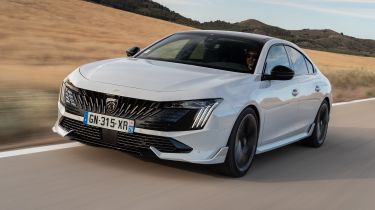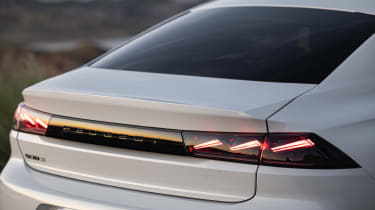New Peugeot 508 PSE 2023 review
Peugeot’s high performance 508 PSE flagship doubles down on the brand’s racing DNA

Verdict
Aside from a few visual tweaks, Peugeot’s 508 PSE hasn’t really changed with this facelift, so will remain an expensive niche offering that has a few rough edges offset by some genuinely impressive driving manners. The difference now is that there’s an obvious connection between the 508 PSE and the similarly-coloured racing car that's making waves on the endurance racing scene. It should up the desirability of the road car in a tough class.
The premise was very simple when Peugeot launched its 508 PSE back in 2020. The French brand had committed to the new Le Mans Hypercar-class rules and was in development of a hybrid endurance racer, but the connection to its road cars was tenuous, at best. GTi, the iconic brand that had been applied to Peugeot’s high performance hot hatchbacks was now defunct, so to bridge that gap a sub-brand called Peugeot Sport Engineering was created, along with a car to sit within it – fresh in its machine grey and acid green branding.
As far as establishing a link between a hot family-size car like the 508 PSE and a competition hypercar like the 9X8 goes, Peugeot made a very good fist of it, integrating a clever twin-motor hybrid system into the road going model. Now, after a few years on sale, the PSE has had a light facelift that aims to accentuate its connection further still.
Used - available now
New for the Peugeot 508 PSE is the front end, which has been designed to fit the new design language being developed by new Peugeot design boss Matthias Hossann. In this case, the nose has picked up plenty of black detailing, mixing the intricate vertical strakes that mark out the PSE brand to Peugeot’s new corporate grille and badge. It could have been a mess, but somehow works. What’s less successful is the new integration of the triple-claw LED daytime running lights, as while they’re still quite striking, they’re less confident and dramatic than the single fangs of the pre-facelift model.
The 2024 update has also yielded some minor changes to the 508 PSE’s interior tech, such as the tweaked 10-inch touchscreen. Despite a few suspect materials, the whole interior experience feels distinctive and well put together, with the physical keys for the media, nav and phone making up for the latency found in the touchscreen. If you’re used to Tesla-like simplicity for the digital interfaces you will be disappointed, though, and the Peugeot system is also still behind the latest BMW, Mercedes and Audi ones, all of which have made great strides of their own.
The 508’s low roofline can make ingress and egress difficult, the narrow windows making the cabin feel a little gloomy. Actual space inside is good, however, with impressive legroom and a large 530-litre boot. It’s not as spacious as a rival VW Passat or Skoda Superb, but is on par with premium rivals like the BMW 3 Series or Audi A4.
Yet the PSE’s raison d’etre has always been its fascinating high performance plug-in hybrid powertrain. The layout in this updated model is unchanged but as a refresher, it contains a turbocharged 1.6-litre four-cylinder petrol engine that produces 197bhp and 300Nm of torque, with a 109bhp electric motor mounted within the eight-speed automatic transmission. This part of system powers the front wheels exclusively. There’s then a second electric motor mounted on the rear axle - this one is slightly more powerful with 111bhp. Both of the electric motors draw power from a 12.4kWh battery pack.
While the system’s power adds up to a total of 417bhp, the peak able to be produced at any one time is rated at 355bhp, as not all the power sources produce their highest figures at the same time. This is a complication for most high performance plug-in hybrids.
The powertrain’s overall feeling is of a small petrol motor augmented by significant electrical assistance. As well as adding drive, the electric motors also fill in the gaps in the petrol engine’s power delivery, and because the rear motor doesn’t run through the eight-speed transmission it can also torque-fill during upshifts.
Like many of these complex high performance plug-in hybrids, the driving experience varies massively depending on the selected drive modes, making the PSE feel like two or three completely different cars. At start-up, the PSE automatically reverts to pure electric mode if there’s sufficient charge in the battery. Without the influence of the petrol motor and with the relative limitations of the battery pack, performance is only adequate, but is perfectly fine for the job of mooching around city centres.
Next up is Hybrid mode, which wakes up the petrol engine at higher speeds but still relies heavily on the electric motors. Yet it does this without significantly eating into the battery capacity, refiling where possible with brake energy regeneration. On smooth flowing roads, we found this to be an ideal compromise between performance and efficiency while keeping enough volts in the battery to be able to switch back to EV mode for significant stretches.
Yet it’s Sports mode that unlocks the powertrain’s full potential. Now the PSE feels swift and effortless, if not quite rapid at 5.2 seconds to 62mph. Here the petrol engine is now constantly connected to the gearbox and front wheels rather than dropping in and out as per the other modes, augmented by the electric motors at their full potential. Now it’s the rear motor that has a louder presence, taking the strain off the front tyres to help push the 508 out of bends. There has been some improvement to the calibration in this updated model, but you’re left in no doubt that there’s some complex inner workings providing that performance.
Despite the Impressive powertrain, the best bits of the PSE is its ride and handling, as both are excellent. All PSEs run on 20-inch wheels, with high-specification Michelin Pilot Sport 4S rubber, combined with electronically adjustable dampers with specific setups for Comfort, Hybrid and Sport modes. Overall, the PSE’s handling is balanced, agile and rewarding, without feeling wayward or aloof. The large 380mm front brakes, despite having a slightly muddy pedal feel due to the regenerative braking, are extremely strong and confidence inspiring too, so you quickly find yourself digging deeper and deeper into their performance.
The Peugeot 508 PSE is priced from £53,725. Compared to fast estates of a similar price like the M340i or Audi S4 it certainly has a unique angle in the sector, especially if a plug-in powertrain yields financial benefits. In fact, its biggest issue is the fact it doesn’t share an instantly recognisable premium badge on the nose. However, this is something that the 9X8 racer is helping change, and just as the racer continues to stand out from the crowd within a field of Ferraris, Porsches and BMWs at Le Mans, so too does Peugeot’s 508 PSE offer a willing and captivating package that steps away from the norm.
| Model: | Peugeot 508 SW PSE |
| Price: | £53,725 |
| Engine: | 1.6-litre 4cyl turbo hybrid petrol, 2x e-motors |
| Power/torque: | 355bhp/520Nm |
| Transmission: | Eight-speed automatic, all-wheel drive |
| 0-62mph: | 5.2 seconds |
| Top speed: | 156mph |
| Economy/CO2: | 156.9mpg/40g/km |
| On sale: | Now |














